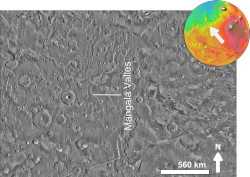| This article contains too many pictures for its overall length. Relevant discussion may be found on the talk page. Please improve this article by removing indiscriminate collections of images or adjusting images that are sandwiching text in accordance with the Manual of Style on use of images. (November 2024) (Learn how and when to remove this message) |
 The Mangala Valles and Mangala Fossa The Mangala Valles and Mangala Fossa(THEMIS image) | |
| Coordinates | 11°36′S 151°00′W / 11.6°S 151.0°W / -11.6; -151.0 |
|---|---|
| Length | 828.0 km |
The Mangala Valles are a complex system of criss-crossing channels on Mars, located in the Tharsis region and in the Memnonia quadrangle. They originated in the Hesperian and Amazonian epochs. They are thought to be an outflow channel system, carved by catastrophic floods, and the release of vast quantities of water across the Martian surface. This flooding was probably initiated by tectonic stretching and the formation of a graben, Mangala Fossa, at the channels' head, perhaps breaching a pressurized aquifer trapped beneath a thick "cryosphere" (layer of frozen ground) beneath the surface. The Mangala Valles contain several basins; after they filled, the overflow went through a series of spillways. One source of waters for the system was the Memonia Fossae, but water also probably came from a large basin centered at 40 degrees S.
A recent study that used photogeologic analysis, geomorphic surface mapping, cratering statistics, and relative stratigraphy, demonstrated that the Mangala Valles were flooded by water at least twice and covered with lava at least three times during the Late Amazonian. The presence of scoured bedrock at the base of the mapped stratigraphy, together with evidence from crater retention ages, suggests that fluvial activity came before lava flows. These alternating periods of aqueous flooding and volcanism are similar to that of other outflow systems on Mars, such as Ravi Vallis and the Kasei Valles.
There are wind-sculpted ridges, or yardangs, covering many of the surfaces in the Mangala Valles region.
"Mangala" is the name for Mars in Jyotish (or Hindu) astrology.
Gallery
The Mangala Valles and Mangala Fossa (USGS maps) Context
Context Close-upTopographic maps (MOLA) – Memnonia region of Mars (left); and a close-up (right) of the location of Mangala Fossa and the source of the Mangala Valles outflow channels.
Close-upTopographic maps (MOLA) – Memnonia region of Mars (left); and a close-up (right) of the location of Mangala Fossa and the source of the Mangala Valles outflow channels.
-
A streamlined island within the Mangala Valles, as seen by THEMIS.
-
The Mangala Valles, as seen by HiRISE.
-
 Streamlined feature in the Mangala Valles, as seen by HiRISE under the HiWish program. Many dark slope streaks are visible. Location is Memnonia quadrangle.
Streamlined feature in the Mangala Valles, as seen by HiRISE under the HiWish program. Many dark slope streaks are visible. Location is Memnonia quadrangle.
-
 Part of the Mangala Valles, as seen by HiRISE under the HiWish program. Location is Memnonia quadrangle.
Part of the Mangala Valles, as seen by HiRISE under the HiWish program. Location is Memnonia quadrangle.
In fiction
- The Mangala Valles are referred to in Michael Crichton's book Sphere.
- In Stephen Baxter's novel Voyage, they are the location of the first crewed Mars landing.
- They are mentioned in Terry Pratchett's and Stephen Baxter's novel The Long Mars.
- They are also the location of the first crewed Mars base in Codex Regius (1999). Horsemen of Mars. ISBN 978-1499274578.
See also
References
- "Mars Channels and Valleys". Msss.com. Retrieved 13 January 2015.
- Michael H. Carr (2006). The surface of Mars. Cambridge University Press. ISBN 978-0-521-87201-0. Retrieved 21 March 2011.
- Carr, M. 1979. Formation of martian flood features by release of water from confined aquifers. Journal of Geophysical Research 84: 2995-3007.
- Hanna, J. and R. Phillips. 2005. Tectonic pressurization of aquifers in the formation of Mangala and Athabasca Valles on Mars. LPSC XXXVI. Abstract 2261.
- Ghatan, Gil J.; Head, James W.; Wilson, L.; Leask, H.J. (2004). "Mangala Valles, Mars: Investigations of the Source of Flood Water and Early Stages of Flooding - Lunar and Planetary Science XXXV (2004)" (PDF). Lunar and Planetary Institute. Retrieved 6 December 2015.
- Leask, Harald J.; Wilson, Lionel; Mitchell, Karl L. (24 February 2007). "Formation of Mangala Fossa, the source of the Mangala Valles, Mars: Morphological development as a result of volcano-cryosphere interactions" (PDF). Journal of Geophysical Research. 112 (E02011): E02011. Bibcode:2007JGRE..112.2011L. doi:10.1029/2005JE002644. S2CID 14798124.
- Leask, Harald J.; Wilson, Lionel; Mitchell, Karl L. (4 August 2007). "Formation of Mangala Valles outflow channel, Mars: Morphological development and water discharge and duration estimates" (PDF). Journal of Geophysical Research. 112 (E08003): E08003. Bibcode:2007JGRE..112.8003L. doi:10.1029/2006JE002851.
- Cabrol, N. and E. Grin (eds.). 2010. Lakes on Mars. Elsevier. NY.
- Emrick, C. and R. De Hon. 1999. Flood discharge through Labou Vallis, Mars. Lunar Planet. Sci. Conf. XXX: Abstract #1893.
- Zimbelman, J. et al. 1992. Volatile history of Mangala Valles, Mars. Journal of Geophysical Research 97: 18309-18317
- De Hon, R. 1994. Lacustrine sedimentation in lower Mangals Valles. Mars Lunar Planet. Sci. Conf. XXVII: 295-296
- Keske, Amber L.; Hamilton, Christopher W.; McEwen, Alfred S.; Daubar, Ingrid J. (2015). "Episodes of fluvial and volcanic activity in Mangala Valles, Mars". Icarus. 245: 333–347. Bibcode:2015Icar..245..333K. doi:10.1016/j.icarus.2014.09.040. PMC 5701667. PMID 29176911.
- Leask, Harald J.; Wilson, Lionel; Mitchell, Karl L. (13 June 2006). "Formation of Ravi Vallis outflow channel, Mars: Morphological development, water discharge, and duration estimates" (PDF). Journal of Geophysical Research. 111 (E8): E08070. Bibcode:2006JGRE..111.8070L. doi:10.1029/2005JE002550.
- "Catalog Page for PIA03827". Photojournal.jpl.nasa.gov. Retrieved 13 January 2015.
- "The Planet Mars: A History of Observation and Discovery". Uapress.arizona.edu. Archived from the original on 4 October 2014. Retrieved 13 January 2015.

